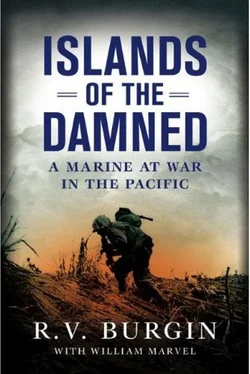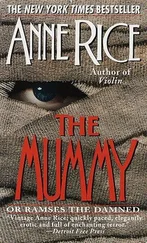For the next month and a half the three battalions of the Fifth Marines would scour Talasea Peninsula and beyond, looking for the Japs. K Company was sent south from the mission at Bitokara toward a place on the map called Numundo Plantation, at the base of the peninsula. It was supposed to be a three-day patrol.
We had those little spotter planes—we called them grasshoppers—to help us off and on. One afternoon I saw a Japanese Zero get after one of those planes. The grasshopper was flying along the edge of the ocean, about fifty miles an hour or so. When the Zero showed up, the spotter plane dipped down to tree level and started weaving back and forth. The Zero must have been going more than a hundred, and he couldn’t adjust. He made a pass at that little plane moving in slow motion and overshot his target and went flying by. Then he came around and made another pass—he missed again. As we watched he made pass after pass firing at the grasshopper, which kept zigzagging frantically. Finally I guess the Zero ran out of ammunition and flew off. Never did hit him. We were cheering for that little plane until he flew out of sight.
We were out more than ten days. And every day, it seemed, we would run into an ambush. As usual they’d leave a few guys behind with knee mortars and a machine gun. Before we could flank them they’d disappear. It was just aggravating. The few we came upon were in about as bad a shape as we were in, and they’d been there a lot longer. They were sick with malaria and were starving. Their wounds weren’t healing. We tried to take them with us, but sometimes we had to leave them behind.
Along the way we ran into groups of dark-skinned natives who had come down out of the mountains, where they’d been hiding out with their wives and children after the Japs had started raiding their villages and plundering their gardens. Whenever we needed working parties they were there, about fifteen or twenty of them ready to carry ammunition and supplies.
Every so often we came upon a deserted village or coconut plantation. At one of them I saw this kid who looked like he could have been twelve to fifteen years old, maybe sixteen. It was hard to tell. He put his hands and feet on a coconut tree, with a machete tied around his waist, and he just walked up that thing. Climbed all the way to the top with his hands and feet. When he got to the top he took his machete and lopped the coconuts off. Then he came down the same way he went up.
We didn’t eat a lot of coconuts, but we’d slash the ends of them off and drink the milk and throw the rest away.
One afternoon we stopped in a clearing around an abandoned hut. Some of our guys went to fill their canteens down by a creek, where the Japs opened up with machine guns. Everybody got the hell out of there, but they may have hit a couple of natives.
Later in the evening we were digging foxholes and the Japs started shelling us with knee mortars. We started digging faster. The natives grabbed sticks, tin can lids, or chunks of metal, or used just their hands, and started digging a long trench about a foot to eighteen inches deep. They were digging faster than we were with our entrenching tools. When they finished they just lay down in that thing, head to foot, head to foot.
We moved on, continuing to encounter rain-swollen streams. The wider ones we would follow down to the beach, where the flood had pushed up an apron of sand, and we’d wade across in the shallow water. A tree had fallen across one stream and we could hang on to the branches to cross over. Most of us had made it to the other side when the man in front of me, Andrew Geglein, slipped and went down on the upstream side. He disappeared into the chocolate-colored water with his rifle and all of his gear, just vanished. We thought he’d be washed underneath the fallen tree, and one of the guys got in on that side and searched along the log, and then farther downstream. Time was of the essence. Then another guy jumped in on the upstream side and groped along until he found Andrew hung up on the branches underneath. We hauled him up out of the water, but he was already gone.
I thought, That’s a terrible way to lose your life when you’re fighting a war.
After ten days out on patrol we got word to return to Bitokara. I don’t know why, and I don’t know what happened, but we were glad to get out. We just hauled ass. By then we had a lot of men wounded and a lot of men killed. I figure we were down to about three-quarters of a company. Around 235 men went in and about 175 or 180 came out.
It was the last combat we were to see on New Britain.
I had a souvenir to take with me. I had found a fine hara-kiri knife, a beautiful thing with an ivory handle and sheath.
Hara-kiri—they would do that. About thirty yards beyond one of the creeks we’d crossed, we came upon a Jap officer lying on his back with his knees up. I don’t know whether he had been standing or kneeling when he had stabbed himself, but he had a bayonet stuck in his belly, and his hands were still curled around the grip. We didn’t know how long he had been there. His face and body were black and bloated. I didn’t take that bayonet.
Somebody else beat me to it.
* * *
After we came off the Numundo patrol we hung around Bitokara for a month. The mission was on a hill overlooking a small harbor, where we swam and fished. There were broad lawns and flowers and fruit trees, including a pepper tree. I’d never seen one before. It was about eight or ten feet high and absolutely loaded with those little tabasco peppers. We also saw banana trees, though no bananas. Nearby there was a native village. The place must have been a tropical paradise before the war.
We swam in the local hot springs, in water as clear and soothing as in a bathtub. For most of us it was the first hot bath we’d had since Melbourne.
But the food situation didn’t improve that much. There was never enough of it. About a month or so after we’d landed they brought out hot field-cooked meals to the front lines. There was a little piece of ham about three inches wide and a quarter inch thick, some potatoes, some cabbage. And a big navel orange. I looked at my mess tin and thought, What the hell? Do they think they’re feeding a canary?
And do you know? I couldn’t eat all of it. My stomach had shrunk so much, I could not clean my plate. I saved the orange for later on but I never did eat it. I went into New Britain weighing 180 pounds. I came out weighing 140.
We’d go in for lunch and they’d serve soup so thin you could read a newspaper through it. At night we’d designate one man to go down to the chow dump, where they stockpiled all the food, and he’d bring something back to the battalion, a gallon can of peaches or fruit cocktail or something like that. Everybody got their canteens out to have some, including our lieutenant. I’ll call him “Legs,” because he was a tall, gawky guy.
I guess we weren’t the only ones raiding the chow dump, because headquarters finally came out with an order that anyone caught stealing food would be court-martialed.
When that order came down, Legs called us together and chewed our butts. He got real indignant about the whole thing. “ You guys are going to have to stop stealing that food! They’re going to court-martial your ass!” A real big shot.
He had eaten as much of that fruit as anyone else. I thought, What kind of officer is this? So afterward I said to the guys, “Don’t pay any attention. Let’s go ahead and take the food, but make damn sure we don’t get caught. Whenever it comes into camp, we just won’t let him know it’s here and he won’t get any more.”
And we did, and he didn’t.
It was not the last time I was to get crossways with Lieutenant Legs.
Читать дальше











